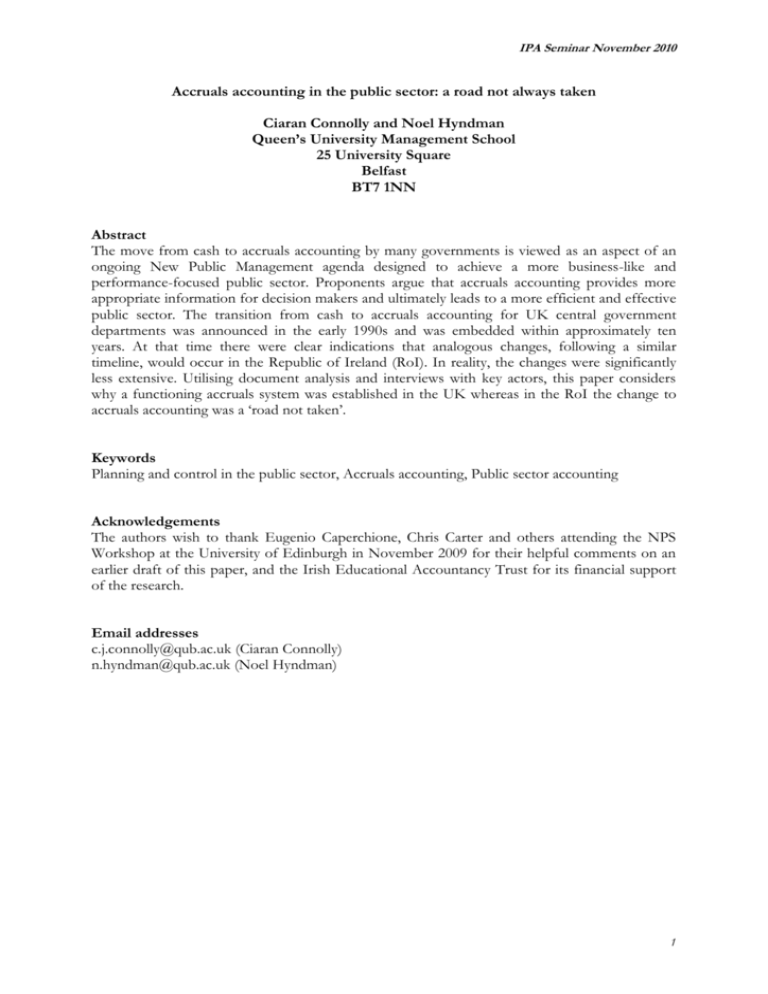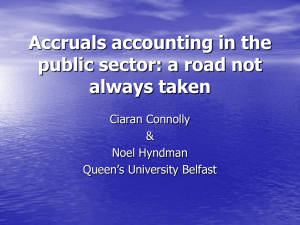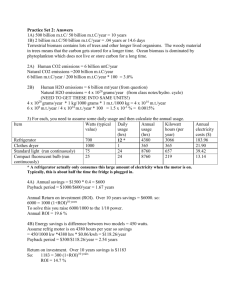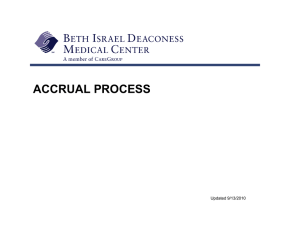Accruals accounting, Public sector
advertisement

IPA Seminar November 2010 Accruals accounting in the public sector: a road not always taken Ciaran Connolly and Noel Hyndman Queen’s University Management School 25 University Square Belfast BT7 1NN Abstract The move from cash to accruals accounting by many governments is viewed as an aspect of an ongoing New Public Management agenda designed to achieve a more business-like and performance-focused public sector. Proponents argue that accruals accounting provides more appropriate information for decision makers and ultimately leads to a more efficient and effective public sector. The transition from cash to accruals accounting for UK central government departments was announced in the early 1990s and was embedded within approximately ten years. At that time there were clear indications that analogous changes, following a similar timeline, would occur in the Republic of Ireland (RoI). In reality, the changes were significantly less extensive. Utilising document analysis and interviews with key actors, this paper considers why a functioning accruals system was established in the UK whereas in the RoI the change to accruals accounting was a ‘road not taken’. Keywords Planning and control in the public sector, Accruals accounting, Public sector accounting Acknowledgements The authors wish to thank Eugenio Caperchione, Chris Carter and others attending the NPS Workshop at the University of Edinburgh in November 2009 for their helpful comments on an earlier draft of this paper, and the Irish Educational Accountancy Trust for its financial support of the research. Email addresses c.j.connolly@qub.ac.uk (Ciaran Connolly) n.hyndman@qub.ac.uk (Noel Hyndman) 1 IPA Seminar November 2010 1. Introduction Over the last 25 years, numerous changes, which collectively are categorised as New Public Management (NPM), have been introduced at different paces and in different ways in public sectors across the world, including the United Kingdom (UK) and Republic of Ireland (RoI). These changes often include a move from a cash-based to an accruals-based accounting system in the belief that this will provide more appropriate information for decision makers and lead to better decision making. In the early 1990s, the UK and RoI governments provided clear indications of their desire to introduce accruals accounting in central government in the near future. However, while accruals accounting was embedded in the management accounting and financial reporting systems of UK central government departments by 2003, change in the RoI has been minimal. Given the apparent initial desire to introduce accruals accounting in central government in both the UK and RoI, this paper examines the impact of its adoption in the UK and explores the reasons why significant accruals-accounting principles were not ultimately embedded into the RoI’s central government. In terms of the format of the paper, the next section discusses the linkages between NPM, accruals accounting and new institutional theory in order to provide a theoretical and contextual backdrop for the reported empirical research. This is followed by an analysis of recent changes in government accounting systems in both the UK and RoI. After outlining the research method, the next section reports the results of semi-structured interviews with key actors in the public administrations in both jurisdictions. In the final sections the results are discussed and conclusions drawn. 2. NPM, accruals accounting and institutional theory 2.1 Variability of adoption NPM is a collective term used to classify broadly similar public sector reforms that have been introduced in many Organisation for Economic Co-operation and Development (OECD) countries since the late 1970s. These reforms include the adoption of private sector managerial techniques, the development of market mechanisms and the break-up of government into smaller quasi-autonomous units. Research indicates that some countries have implemented NPM-style changes at a quicker pace and more enthusiastically than others, with Hood (1995) identifying high- (Australia, New Zealand and the UK), medium- (Austria, Italy and the RoI) and lowintensity adopters (Greece, Japan and Spain). He argues that, while right-wing political orientation, poor economic performance or government size do not necessarily mean increased use of NPM techniques, the existence of both motive (for example, potential savings from implementation) and opportunity (for example, limited constitutional checks on central government) may be important determinants. Pollitt and Bouckaert (2004), who contend that reforms are easier to push through in a centralised state that operates a majoritarian, rather than consensual, approach to government, argue that the cultural climate of a country has a major influence on the success of public sector reform programmes. With respect to culture, Hofstede (2001) suggests that the UK has a much greater individualistic orientation than the RoI. While Hofstede’s work is not without criticism (Harrison and McKinnon, 2007), it possibly indicates a more accepting environment for NPM ideas in the UK than in the RoI. In the field of accountancy, many, although by no means all, governments that have embraced NPM ideas have also adopted accruals accounting. Indeed, it is argued that without accruals accounting some of the NPM changes would be weakened (Likierman, 2003). Since the late 1980s there has been a significant movement towards accruals-oriented public sector accounting, most notably in countries such as Australia and New Zealand, with proponents 2 IPA Seminar November 2010 claiming that it provides new and, arguably, better information. It is asserted that in a cash-based system, there is an inbuilt bias against rational capital investment and that the information provided through accruals accounting enables better-informed decisions on the balance between current and capital expenditure, taking into account the opportunity cost of capital and its consumption over time. However, an increasing body of literature has criticised the adoption of accruals accounting by public sector organisations on both theoretical and practical grounds. Guthrie (1998) argues that, in the context of the public sector, accruals accounting is inferior and unsuitable because: profit is not a goal and cannot consequently be a relevant measure of performance; financial structure and solvency are not relevant in the public realm; accruals accounting does not measure outcomes; and accruals accounting provides a narrow idea of performance, focusing on cost of services and efficiency. In addition, Hepworth (2002) urges caution to governments contemplating the change to accruals accounting, arguing that accruals accounting will not solve underlying financial control problems; indeed it will make them worse because it arguably leaves greater scope for judgement (however this, given the political dimension of public sector budgeting, may be attractive to politicians as it offers more flexibility for window dressing). Cashbased accounting has the virtues of simplicity, understandability and objectivity, qualities which should not be underestimated, particularly as in many government departments there are few, if any, skilled accountants and preparing and understanding the related information requires a degree of training (Pina, Torres and Yetano, 2009). Regardless of the warnings against the unthinking adoption of private sector practices, in particular accruals accounting, it is argued that there is pressure on the public sector to reform and to demonstrate efficiency and effectiveness, with the implementation of accruals-accounting systems often being viewed as having a prominent role in this process (Pallot, 1992). As NPM advocates mimicry of private sector practices and emphasises quantification and performance measurement, it has had a profound effect on public sector accounting practices, with the need for accruals accounting being seen as ‘self-evident’ (Lapsley, Riccardo and Paulsson, 2009), perceived as progress (Guthrie, Humphrey, Jones and Olson, 2005) and viewed as fashionable (Hepworth, 2002). 2.2 Institutional theory NPM literature typically suggests that functional or rational reasons (to improve efficiency and effectiveness) are the primary motivations for change. However, in contrast, institutional theory stresses that other factors related to both internal and external organisational expectations and values can play a part (Meyer and Rowan, 1977). As this includes the influence of the social and cultural aspects of an organisation’s environment, it broadens the range of aspects which should be considered when assessing organisational change. Institutional theory seeks to explain the isomorphism of organisations, a key aspect of which is that organisations may adopt certain characteristics in order to appear legitimate, when, in fact, there are no technical economic efficiency gains from doing so. Meyer and Rowan (1977) suggest that reforms are sometimes only introduced to satisfy external rules or expectations (for reasons of ‘external legitimation’) in order to portray an organisation as appropriate, rational and modern, and thereby seeking to avoid critical attention and questions from its social environment. Moreover, research indicates that institutional pressures for governments to adopt generally accepted accounting principles, and thus accruals accounting, may stem from normative pressures from professional (accounting) associations (DiMaggio and Powell, 1983; Pina, Torres and Yetano, 2009). However, Carpenter and Feroz (2001), whilst acknowledging this tendency which may encourage the adoption of accruals accounting, warn that such a course of action is an expensive one, involving many actors across government who must be educated and persuaded that the changes are necessary. They also suggest that where self-interest maximising actors only have limited influence over the choice of 3 IPA Seminar November 2010 accounting practices (for example, in the public sector where statutes dictate accounting methods), bureaucrats may not independently have the political influence or power to change existing practices. In such situations this may lead to ‘organisational imprinting’, where organisations retain practices not by rational design but because they are accepted ‘as the way things are done’. Logic refers to broad cultural beliefs and rules that structure cognition and fundamentally shape decision making and action (Lounsbury, 2007, 2008; Marquis and Lounsbury, 2007). In recent years, some institutional authors have focused on the influence of multiple and competing logics, concluding that such logics, especially those rooted in geographical (and cultural) differences and broader belief systems, create variation in practice. Lounsbury (2008) argues that early neoinstitutional formulations and empirical research that almost exclusively emphasised isomorphism by showing how practices spread throughout various fields was fundamentally flawed in that it maintained a distinction between technical forces and rational decision-making on the one hand, and institutional forces and irrationality on the other. This has been especially apparent in empirical research that emphasises a two-stage diffusion process whereby early adopters are motivated by technical considerations and later adopters engage in mindless imitation fuelled by anxiety-driven pressures to conform. Lounsbury argues that technical rationality is often culturally constructed and most environments are subject to multiple, competing logics that provide a foundation for ongoing contestation and change. Following similar themes, Pina, Torres and Yetano (2009) point to the public administration culture and historical background when trying to understand change and innovation and distinguish between different styles of public management. Using such a framework, the UK fits the Anglo-Saxon style (emphasising efficiency, effectiveness and value for money, and characterised by stronger influence of the professional accounting associations) whereas the RoI, given its tendency towards a pluralistic/consensual style of government, arguably demonstrates aspects of a questioning Nordic style. 3. Trajectories of change 3.1 The UK – from cash to accruals accounting In the UK, which consists of four separate countries (England, Northern Ireland (NI), Scotland and Wales) within one main political unit, the move from cash to accruals accounting for central government was viewed as significant and highlighted as such by politicians. For example, Kenneth Clarke, the then UK Chancellor of the Exchequer, stated ‘people will find other ways of celebrating the millennium but few will be more important. This is one of those highly significant events’ (HM Treasury, 1995, p. 1). A phased introduction, where systems were to be developed and resources, including skilled personnel, were to be acquired, was approved for the changes which were implemented under the title Resource Accounting and Budgeting (RAB). Resource accounting (RA) applies accruals principles to public sector accounting and seeks to integrate objectives and targets into the accounting system. Resource budgeting involves using RA information as the basis for planning and controlling public expenditure in order to make the management accounts align with the external accounts. The key events associated with the introduction of RAB in the UK are outlined in Table 1. As can be seen, since the fiscal year 2003/2004 UK central government departments have been operating on an accruals basis for both accounting and budgeting. For a detailed discussion of this, and the actual implementation process, see Connolly and Hyndman (2006). 4 IPA Seminar November 2010 Table 1 Key events associated with the introduction of RAB in the UK Year 1994 1995 1998/99, 1999/00 and 2000/01 1999 2001/02 2001/02 and 2002/03 2003/04 Key Event Green (consultation) paper published by HM Treasury. White (policy) paper published by HM Treasury. Dry run years for production of resource accounts. Dry-run exercise undertaken for resource budgets. Resource accounts fully implemented. Resource budgets transitional years. Resource budgets fully implemented. 3.2 The RoI – from cash to cash with some accruals notes In the late 1980s and early 1990s there was strong interest and awareness in the RoI of the NPM reforms being introduced in many OECD countries. The Irish Public Service Modernisation Programme (IPSMP) has its roots in the 1994 Strategic Management Initiative (SMI) that began a rolling programme of modernisation and change initiatives in the RoI civil service. It appeared that a central aspect of this was the need to improve the underlying accounting system and move from cash to accruals as a basis for underpinning better decision making and accountability. The key events associated with the IPSMP as relating to accruals accounting are outlined in Table 2 (for more detail see Connolly and Hyndman, 2009). Table 2 Key events associated with the IPSMP Year 1994 1995 19951997 1996 1999 1999 2002 Key Event Departments required to compile a fixed asset register and to present limited accruals-based information alongside their cash-based appropriation accounts (AAs). SMI Co-ordinating Group of Secretaries of Departments established to bring forward proposals to modernise systems and practices. Department of Public Enterprise (DPE) pilot project to produce accruals-based financial statements. Delivering Better Government (DBG) published (Department of the Taoiseach, 1996). This report identified improved financial management, including developing accrualsbased accounts, and the use of information technology as the main areas requiring change. The aim was to implement new systems in all departments within five years. Financial Management in a Reformed Public Service published (Department of the Taoiseach, 1999). This report advocated the development of a common financial management system to facilitate accruals-based reporting for financial and management accounting purposes. Management Information Framework (MIF) project commenced to develop a single financial management and control framework (capable of producing accruals information) for each department. By the end of 2005, all departments had installed new (separate) information systems. Report of the Management Accounting Working Group accepted that: the ‘current’ cash reporting system was insufficient for assessing departmental performance; the DPE pilot project was a suitable model on which to develop financial reporting; and the MIF project provided an opportunity for departments to produce the accruals information reports envisaged in DBG. 5 IPA Seminar November 2010 Since the mid-1990s there was a recurring rhetoric advocating the need to embed accruals accounting more significantly in reporting systems, with all indications being that the RoI was on a pathway to significant accounting change. However, from 2002, almost imperceptibly, this rhetoric largely disappeared, and the push for accruals accounting subsided. Despite the MIF having an accruals facility (which remained largely underused), this left the RoI with cash-based AAs supplemented by departmental fixed asset registers and some accruals-based information (essentially produced at year end) appended to the AAs (a much lesser degree of change than that suggested in official publications from the mid-1990s). Despite the grand plans and rhetoric, accruals-accounting information became merely a by-product of the external financial accounts (with the accounts remaining largely cash based) and it was never embedded in the management accounting framework within central government departments. 4. Research method As encouraged by Christensen and Parker (2010) in their study of the introduction of accruals accounting in Australia, the empirical research in this paper utilises semi-structured interviews with key actors involved in the operation of departmental accounting systems at a high-level (‘Operational Accountants’) and those concerned with the formulation, implementation or review of policy relating to accounting systems in the UK or RoI (‘Overseers/Commentators’) (see Tables 3 and 4). For logistical reasons, while RAB was implemented throughout the UK, the interviews were conducted with actors based in NI who were chosen because of their extensive public sector experience, seniority and assumed technical knowledge. As accounting techniques have an aura of logic, objectivity and accuracy, particularly strongly among those not technically equipped to deconstruct accounting numbers (Ezzamel, 1994), it was considered that such interviewees were in a unique position to provide realistic and well-informed views on the issues. Given the potential sensitivities of the matters being discussed and the desire for the participants to be as candid as possible, interviewees were informed that the interviews would be reported in a manner where statements could not be attributed to specific individuals. However, the results are presented in such a way so as to be able to distinguish between possible differences of opinion between the actors in each jurisdiction. Table 3 Individual interviewee classification Role Jurisdiction UK 9 4 13 Central Government Department Operational Accountant Overseer/Commentator RoI 11 11 22 Table 4 Organisation interviewee classification Role Central Government Department Overseer/Commentator Organisation Jurisdiction UK (UKA1 – 8) 8 (UKO/C 1 – 3) 3 11 RoI (RoIA1 – 7) 7 (RoIO/C1 – 4) 4 11 6 IPA Seminar November 2010 Since the paths chosen in the two jurisdictions were very different (as seen above), this was reflected in the interview guides. Drawing on the main themes identified in the literature and official UK and RoI government publications, the UK guide explored the impact of the introduction of RAB several years into its operation while the RoI guide investigated the reasons why, despite official utterances to the contrary, the eventual change was extremely limited. Although many of the UK interviewees were qualified accountants, this was the case for only a small minority of the RoI interviewees, including the ‘Operational Accountants’ (far fewer qualified accountants are employed in the RoI public sector, with many accounting positions being filled by career civil servants). 5. Results of empirical research 5.1 The UK story: the accruals road The empirical work with respect to the UK reported in this paper is based on interviews with key actors in 2008 and 2009. Earlier work by Connolly and Hyndman (2006), that charted the intial impact of RAB, found that: inadequate accounting skills in departments led to difficulties in implementation; the information was rarely used at the early stages; and the costs of this accounting change were unclear (but were likely to have been substantial). The authors suggested that, at best, a lengthy continuum of accounting change was underway that featured introduction, development and maturity stages, with limited early progress in moving along this continuum. However, later Australian research by Kober, Lee and Ng (2010) found that perceptions of usefulness of accruals information increase over time as familiarity grows. The research reported in this paper explores the accounting choice of adopting accruals accounting principles by considering the experience as RAB has bedded down. It reports the findings under three headings: understandability, use and complexity of RAB; cost-benefit issues; and availability of budgetary reports for departmental boards. Understandability, use and complexity of RAB The overwhelming consensus among all interviewees was that departments were now confident they could prepare annual resource accounts. However, a lack of understanding of accruals-based information, especially by non-accountants, continued to inhibit its effective use in decision making. I do not know if it’s [Resource Accounting information] being used… but I would be sceptical. .... I am not sure how many people out there in a department or a branch really use it to manage their budget… I am not sure how many working decisions are taken from the accounting information. I am just not sure. It is complex.... Even I don’t fully understand it. UKO/C3 Positive views tended to be short on specifics and high on faith in terms of the potential benefits that have been (or can be) achieved. The closer focus on financial issues has probably led to better decision making than may have been made under cash accounting even though I can’t think of any particular issues at this point of time. You just have a gut feeling that decision making maybe has improved. UKA4 Even in one case that was supportive of RAB, doubts were expressed. 7 IPA Seminar November 2010 There is more focus on the wider and bigger picture. Departments are now aware of what assets they own and there has definitely been more focus on the implications of that. I don’t know whether I would say this has led to better management; perhaps more conscious management. Although sometimes I think the simpler [cash] regime worked just as well. UKO/C3 In relation to the engagement of politicians (a key user group with decision-making responsibilities) with this new information, ‘Operational Accountants’ typically believed that many politicians had limited knowledge and the level of scrutiny was at a superficial level. I have no idea if they understand; they ask how much has been spent in the last five years on whatever, and you just give them the figures. I have no idea whether they understand what they are looking at but you never get any questions back again. UKA3 Contrary to early HM Treasury publications, interviewees were generally reticent about claiming that RAB had led directly to efficiency gains and savings. Broadly there was an acceptance that departments and budget holders were still at an early stage in understanding the information available, knowing what additional information to request and then using it to make decisions (even though systems had been ‘live’ for several years at the time of the interviews). Several respondents were clearly negative when asked about whether RAB had or could lead to efficiency gains and savings. I can’t think of anything specific. UKO/C2 No. UKA1 All of the interviewees agreed that the overall ‘environment’ introduced under RAB was much more complex. In particular, budgeting rules and boundary definitions were seen as problematical. ‘Overseers/Commentators’ (individuals who addressed cross-departmental issues) stressed the non-alignment of the accounting and budgeting boundaries as a real and continuing problem. … you come up with an annual estimates process that is still essentially based on cash. You almost have a dual system operating, I think, that is partly where the complexity arises from. The line of sight 1is an attempt to try to merge the resource accounts with the estimates. Ideally this should have been sorted a few years ago. UKO/C1 While some ‘Operational Accountants’ had unease with alignment, this group’s main concerns related to the twofold ‘cash’ and ‘resource’ control system. ‘Overseers/Commentators’ also highlighted this issue. The reality is that moving to resource accounts has made everything more complex. Instead of just having cash being monitored, cash and resources are monitored so you have this mad rush at the end of the year to see if you are within your cash limit and also your resource limit. It has made it more difficult to manage. If you have some cash left and say you could buy another piece of equipment but you mightn’t have the resources or the depreciation or the cost of capital cover, so you can’t. UKO/C3 Furthermore, some interviewees alluded to the fact that not only was the process complex but that they were still unconvinced of the potential benefits. The line of sight, or alignment, project seeks to address misalignments between budgets, estimates and accounts (see HM Treasury, 2009). 1 8 IPA Seminar November 2010 The concept is wonderful, this idea of matching things… But I don’t really believe it has made any great difference to the way we manage our finances. Also, it’s a great puzzle to me – I don’t get the difference between budgets and estimates and the actual benefit from reconciling our outturn with our estimates and budgets. UKA3 Cost-benefit issues The case for introducing accruals accounting is often articulated on cost-benefit grounds. Better accounting information, which may be more costly to produce, is justified because it leads to better decisions that make more effective and efficient use of resources (key themes in HM Treasury publications supporting the implementation of RAB)2. When asked about this, all interviewees questioned the value of the changes to the accounting system. In reality I am not sure if it hasn’t just introduced a lot of unnecessary complications. There are additional complexities that don’t add very much value at all. The biggest benefit is probably on capital... Unfortunately I don’t think the usage of assets has changed because the accounting treatment has changed. UKA3 Although all acknowledged that no costing of the system change had occurred, the cost was considered to be substantial. In particular, an increase in professionally qualified accountants across all departments (a major aspect of any cost increase) to support the RAB initiative was recognised. Indeed, even the view that these changes operated in the best interests of the accounting profession was highlighted by some (although there were no opinions expressed by the interviewees of self interest by accountants or consultants being at the heart of the RAB agenda). There might be benefits but just look at the number of accountants… the number of staff, qualified staff, now working on the accounting side of things… the cost must have been horrendous and are things really that much better? UKA8 Whether this led to more useful accounting information that supported better decision making was questioned by many interviewees. Indeed, even the ability of the accountants to understand what they were doing was queried. The level of accounting expertise has certainly improved in recent years. There are many more accountants… But I wonder how many of them are just churning out figures that maybe they don’t really understand, and I guess many of the people who are getting these reports don’t have the background to understand them either. UKO/C3 Availability of budgetary reports for departmental boards A key objective of RAB was that managers would have more appropriate budgetary control reports comparing the actual consumption of resources against the budgeted consumption, and this would drive better decision making. The interviews suggest that most departments have introduced structures and procedures for reporting to the departmental board (albeit several years after RAB changes were first made). However, it was clear that practices were fairly variable across departments. It was interesting to note that ‘Overseers/Commentators’ (those removed from the day-to-day detailed issues) were fairly positive about what they perceived as current practices. Reporting to the board is now in place in most departments about the financial position. This was not something that was common even three or four years ago. Our view of it is that most of the departments now produce Using such rationale, while it might have been expected that introducing accruals accounting would have been on the basis of a detailed assessment of costs and benefits, no such study was conducted (Hansard, 1996). 2 9 IPA Seminar November 2010 information, whether it is monthly or quarterly, about the accounts position. That must have a direct consequence. UKO/C2 ‘Operational Accountants’ were more sceptical in terms of the progress in routinely providing the information and the ability of departmental board members to understand and use the information provided. With respect to a number of departments difficulties were highlighted relating to: the provision of accruals information on a routine basis within management reports; and the provision of information on a monthly, rather than a quarterly, basis (a desirable change to align with the normal routine of monthly board meetings). In relation to the ability of departmental board members to utilise the information provided, a number of interviewees suggested that there is a lack of experienced board members who can interrogate, and therefore use, the information (therefore potentially undermining control processes). Most departments have started to do quarterly, and even monthly, reports. Although I have supervised some that are struggling to get quarterly or even half-yearly reports out. I don’t think some of the people preparing it actually understand it. On the boards, while all Directors of Finance are supposed to be qualified, apart from them, I am not sure how many others would have a clear understanding of Resource Accounting. UKO/C3 5.2 The RoI story: the sceptic’s road As outlined earlier (see Table 2), change, involving improved financial management and accruals accounting, was clearly added to the agenda in the RoI civil service. Information systems to buttress such a change were developed and a major pilot project undertaken. However, the impetus appeared to wane from about 2002, and the end result was modified AAs with some accruals notes (a change introduced in 1994, seemingly as a precursor to more substantial change) and the retention of a management accounting system based on cash-accounting principles. The RoI experience reported here deals with the story of accounting choice in a context in which there seemed significant momentum towards implementing accruals-based management and financial accounting systems. Given that, contrary to early official utterances, this did not occur, the research explores possible reasons. Reflecting key questions in the RoI interview guide, the findings are reported under three headings: initial enthusiasm and influences from elsewhere; RoI pragmatism versus UK dogmatism; and the outcome. Initial enthusiasm and influences from elsewhere There was enthusiasm for financial management changes within the RoI’s public sector during the 1990s. The influence of modifications in other countries encouraged the examination of management processes, and there was general recognition that the then present arrangements were far from optimal. In commenting on the main objectives of DBG one interviewee stated: The first objective was to improve the quality and efficiency of financial reporting. It was certainly felt that there were significant gaps in financial reports in the civil service. RoIO/C1 The momentum for change was perceived as fundamentally internally driven and, unlike the UK, there was little involvement of politicians in the debate. When reflecting on the need for change in the context of the introduction of the SMI the following comment was typical: SMI came largely from the administration themselves saying that unless we do something then we are going to be left behind. This was especially the perception of those who had worked or had contact with people in other countries. RoIO/C3 10 IPA Seminar November 2010 Indeed, initially following the launch of the SMI, it seems that key personnel within the civil service became champions for change. These individuals, because of their seniority and the way in which they had networked, significantly influenced the process. Moreover it was felt that, to some extent, their exposure to developments in other countries had impacted on them. ‘Overseers/Commentators’, individuals who had looked at the changes across government departments over many years, particularly highlighted this. I think initially it was largely administrative driven, particularly by a cohort of senior civil servants who were looking elsewhere, talking to people from overseas at meetings, seeing what was happening in other countries and saying ‘we haven’t done anything like this and we need to be showing that we are doing something to modernise our civil service’. RoIO/C3 Several respondents mentioned that a critical influence on the SMI was a cohort of civil servants who undertook a postgraduate course in public management at Trinity College Dublin which involved visiting New Zealand and Australia (countries viewed as high-intensity adopters of NPM reforms) to examine the NPM reform process. Indeed, one striking example of a key individual influencing change was that the early pilot project of providing accruals-based accounting reports for the DPE was championed by one of the MSc cohort. The genesis for SMI was this MSc group of Assistant Secretaries that visited New Zealand and Australia. They were influenced by what they saw there. When they came back, one of the things on the agenda was accruals accounting. They saw this as a better way of doing things. RoIO/C4 As the RoI was considering the move to accruals accounting, the UK had already embarked on implementing RAB. The difficulties emerging with RAB were well-known, and this introduced, or reinforced, caution in the RoI. In addition, the RoI looked further afield. This RoI discernment, where it would select (or reject) NPM reforms (including accruals accounting) considered appropriate (or inappropriate), was clear from the interviews. I do not feel the UK influence was strong at all. We brought some guys over who had been involved in rolling out accruals accounting in the UK. I think we totally frustrated them because we were just concerned with having good management information systems and they couldn’t convince us that moving to accruals for reporting and budgeting was inherently better. My own experience is that the UK had very little influence. We looked at what others did and at the end of the day we did our own thing. RoIA2 RoI pragmatism versus UK dogmatism The idea that the RoI had a pragmatic approach to decisions regarding the adoption of accruals accounting was stressed by several interviewees; with the perceived view being that in the UK public sector reforms, including accruals accounting, tended to be ‘forced’ into the system. In addition, several interviewees reflected on varying cultures in the two jurisdictions, with the RoI being perceived as being less doctrinaire and ideological than the UK. The way we do things is to take things a piece at a time then stop and say ‘is this what we want to do?’ There is very little of that in the UK. RoIA5 Linked to this is the perception that RoI politicians, unlike UK politicians, did not often engage in crusades relating to specific NPM reforms. Moreover, it was suggested that this is related to the lack of a ‘left’/‘right’ split in RoI politics. 11 IPA Seminar November 2010 My view is that we are not ideologically driven. I don’t think you would meet an Irish politician who would say we’ve got to follow New Public Management as a way of changing how the country is managed. …You wouldn’t find people here ever describing a government’s policies as ‘Thatcherite’ or ‘Blairite’ as a way of defining their policies. RoIO/C2 What became clear in the interviews was that individual RoI departments had discretion as to how far, and in what direction, accruals accounting would develop. Given this scenario, and where any benefits were always likely to emerge gradually, it is perhaps unsurprising that enthusiasm for change could not be maintained. Indeed, one of the interviewees who was employed within the DPE in 1995 stated that there was no natural and required roll out of the initial accruals-accounting pilot project into other departments; it was up to individual departments to decide. As a consequence, its impact was extremely limited. We did a pilot it and it resulted in a report. But nobody seemed to be convinced and it didn’t light any light bulbs for anyone. RoIA3 The outcome There was some evidence from the RoI interviews that as greater consideration of the cost/benefit issues with regard to accruals accounting developed, interest waned. The big disadvantage of accruals accounting is that there would be a big resource issue for departments, not only in terms of the staff needed but also building up the skills to do it. People who are not of a financial reporting background generally feel there is not any point in carrying out accruals accounting. They don’t believe there is a need for it. RoIA1 Furthermore, many interviewees commented on a lack of direction from the centre and significant delays as contributing to the loss in momentum. From my own perspective the objective of going to accruals accounting has just faded away. … At a senior level inter-departmental committee I can recall a senior official in the Department of Finance saying that when it comes to accruals accounting I would advise you to make haste slowly. RoIA5 Moreover, the delays possibly even had their own momentum and simply contributed to the doubts about the benefits of accruals accounting. I don’t think anyone has articulated a case against accruals accounting but I think that the lack of progress tells it own story. There was a growing scepticism, which got stronger because of all the half measures. There was no grand plan that people could drive towards, and eventually it just faded out. RoIA2 Several interviewees contrasted where the source of pressure for change in the RoI was emanating from, compared with the UK. With respect to the UK some interviewees saw pressure coming from the top (including politicians) with changes being driven down, whereas in the RoI pressure was more bottom-up with proposed changes being discussed and debated. It was suggested that this provides a possible explanation of the contrasting fortunes of accruals accounting in the two jurisdictions. There is a difference in the UK and Ireland and the way these things happen. In the UK it is mandated and everyone does it. … We [RoI] find a lot of change is bottom up or more consensual. You do find things that evolve into a middle ground and I suspect that’s one way of looking at the accruals issue. … You didn’t get a middle 12 IPA Seminar November 2010 ground forming in which several parties are suddenly saying we need to have this and we should be doing this. When you get that then it becomes diffused and fades. RoIO/C4 6. Discussion and analysis This paper tracks the progress of accruals accounting in central government in the UK and RoI from the early 1990s. While it seemed that a common journey to major accounting change had commenced, the actual outcome of the process was very different in the two jurisdictions. The UK embedded accruals-accounting principles in its management accounting and financial reporting systems, whereas the RoI made fairly modest changes and fundamentally retained cashbased systems. Given the link between accruals accounting and NPM, the varying trajectories of accounting change were perhaps not unexpected. Hood (1995) identified the UK as a high-intensity adopter, as opposed to the RoI being a medium-intensity adopter, of NPM ideas, and the outcome of the change process in the two countries aligns with these classifications. From the interviews, particularly from those conducted in the RoI, and from earlier research (Mellett, Macniven and Marriott, 2007), the UK approach with respect to accruals accounting is portrayed as rather ideological, or perhaps dogmatic, where positions are taken based on insufficiently examined premises. By contrast, the RoI appears more pragmatic whereby an idea or approach is assessed in terms of its observable practical consequences. Coupled with this, a more consensual culture of discussion and debate, in an environment where concerns were increasingly emerging, appears to have slowed, or even dissipated, enthusiasm in the RoI. In particular, a realisation of the difficulty of sustaining the change to accruals accounting on cost-benefit grounds is clear from the UK interviews in this study (and also in earlier Connolly and Hyndman, 2006, research). Such information obviously filtered to those considering change in the RoI (as was highlighted in the RoI interviews) and this seemed to influence opinion. Perhaps a surprising feature of this research is that the RoI ostensibly appeared to commit itself to such a significant and radical accounting change in the early 1990s. An aspect of this appeared to be influenced by the ‘MSc group’ of senior civil servants who visited New Zealand and Australia. These individuals seemed to be convinced by the potential benefits of accruals accounting (albeit that none of this group was from a professional accountancy background) and they sought to become influencers for change within the RoI. However, the ability of this small group of bureaucrats to maintain momentum was limited, something anticipated from Carpenter and Feroz’s (2001) research, as the impact of such a significant transformation became more widely appreciated, and in the more bottom-up, consensual RoI culture, the opportunity to oppose or restrict change was given room to develop. In addition, political forces remained peripheral to the arguments, while the more administrative ‘centre’ (possibly best represented by the Department of Finance), at least initially, appeared supportive but not overly forcing. What occurred with respect to accruals accounting for central government in the RoI can be contrasted with what happened in the UK. RAB was ‘driven’ into the UK, a process possibly redolent of coercive isomorphism (Meyer and Rowan, 1977). Senior political figures had championed a wide range of NPM reforms, providing a rationale for these in terms that the public sector needed to be more performance focused and managers needed to be provided with better information to make decisions. RAB fitted into this scheme and was similarly supported. It was only in 1994 that it was proposed to adopt accruals accounting in central government in the UK; similar to when it was being mooted in the RoI. But what happened thereafter was very different. In the UK the initial announcement was quickly followed by a Green (discussion) Paper in 1994 and a UK Treasury White (policy) Paper in 1995 which contained the broad strategy for managing the transition and presented a timetable for ‘live’ management accounting and financial reporting systems by 2003/2004. 13 IPA Seminar November 2010 A main difference between the UK and RoI is that of political and ideological drive, something suggested by Hofstede (2001) and Pina, Torres and Yetano (2009). Since the 1970s NPM was regarded by all major UK parties as received political wisdom, being viewed as what was required to be a modern, effective public administration. In contrast, the RoI, possibly because of a more consensual, collectivist culture than the UK in terms of both politics and social issues, did not experience such a shift in public policy. A lack of strong political ideology in the RoI, coupled with an electoral system that often resulted in coalition governments (rather than a majoritarian government as was generally the situation in the UK) reinforced a more reflective, gradualist approach. In such an environment radical and speedy shifts in public policy are unlikely; and the opportunity to block change from within, or from below, is increased. Certainly the RoI interviews demonstrated that there was an apprehension of the consequences of change in the RoI public sector, perhaps justifiably so given the lack of understanding of accruals accounting in central government departments. Much of this is redolent of what Lounsbury (2007) describes as differing logics in the two countries. Regardless of the common influential international external forces that projected accruals accounting vigorously as an appropriate accounting technique, differing cultural beliefs, norms and accepted rules of operation and behaviour made the embedding of it problematic (and eventually undesirable) in the RoI. Similarities with Marquis and Lounsbury’s (2007) work in the banking sector (which found local ‘logics’ being mobilised to resist unacceptable broader scale institutional changes) can be seen where, ultimately, distinct modes of operation emerged in different geographic locations. 7. Conclusions It is clear that accruals accounting is well embedded in central government departments in the UK. From the interviews it is seen that, under RAB, the accounting information is complex, few managers understand it and there is limited conviction that its provision has resulted in improved decision making. Moreover, the introduction of RAB has led to significant cost increases (at implementation and in use). Whether, in the long term, this will change is unknown; what is known is that some years after it went ‘live’, several of the UK interviewees questioned its contribution. In the RoI a comprehensive system of accruals accounting does not operate (and looks unlikely in the near future). The fact that almost 20 years ago the RoI apparently started out on the same road as the UK is of interest. The factors leading to a different arrival point may be many including: a rational choice based on pragmatism; a general tendency for the RoI not to embrace NPM ideas with excessive enthusiasm; the weaker ideological and political thrust from the centre; cultural differences; and the disappointing implementation experience of the UK. It appears that a mixture of rational choice and differing logics provides an explanation of what has happened. For the RoI, the change to accruals accounting was a ‘road not taken’ and, as in Robert Frost’s famous poem3, a number of grounds for such a choice are apparent. Using a very positive view of what ocurred in the RoI, perhaps, as could be the case with a range of NPM reforms, a gradualist, ad-hoc, cherry picking, reflective process was used (indicative of, in the words of Lounsbury (2007), a differing RoI logic). Consequently, a comprehensive accrualsaccounting system has been considered and discarded with respect to management accounts, with more modest accruals adjustments made to fundamentally cash-based AAs in respect of financial reporting. Maybe as in the poem: ‘two roads diverged in a wood, and I – I took the one less travelled by, and that has made all the difference.’ Whether such a road was taken by design or default (or a mixture of the two) is unknown, but given the UK experience, who is to say that the In the poem ‘The Road Not Taken’, written by Robert Frost in 1916 and published in Mountain Interval in 1920 by Henry Holt and Company, it is suggested that although one road may seem the obvious route to take, choosing an alternative which is less travelled may be better. 3 14 IPA Seminar November 2010 RoI road, a road less travelled of late by many ‘modern’, western NPM countries, may not have been the wiser choice. References Carpenter, V.L. and Feroz, E.H., 2001. Institutional theory and accounting rule choice: an analysis of four US state governments’ decisions to adopt generally accepted accounting principles, Accounting, Organizations and Society 26, 565-596. Christensen, M. and Parker, L., 2010. Using ideas to advance professions: public sector accrual accounting, Financial Accountability & Management 26, 246-266. Connolly, C. and Hyndman, N., 2006. The actual implementation of accruals accounting: caveats from a case within the UK public sector, Accounting, Auditing and Accountability Journal 19, 272-290. Connolly, C. and Hyndman, N., 2009, The Implementation of Accruals Accounting in the Irish Public Sector: A Comparative Study of Northern Ireland and the Republic of Ireland, Accounting Perspectives, Chartered Accountants Ireland, Dublin. Department of the Taoiseach, 1996. Delivering Better Government, Department of the Taoiseach, Dublin. Department of the Taoiseach, 1999. Financial Management in a Reformed Public Service, Report of the SMI Working Group on Financial Management to the SMI Implementation Group, Department of the Taoiseach, Dublin. DiMaggio, P. and Powell, W., 1983. The iron cage revisited: institutional isomorphism and collective rationality in organisational fields, American Sociological Review 2, 147-160. Ezzamel, M., 1994. Organizational change and accounting: understanding the budgeting system in its organizational context, Organization Studies 15, 213-240. Guthrie, J., 1998. Application of accrual accounting in the Australian public sector – rhetoric or reality, Financial Accountability & Management 14, 1-19. Guthrie, J., Humphrey, C., Jones, L.R. and Olson, O., 2005. International Public Financial Management Reform: Progress, Contradictions and Challenges, Information Age, Greenwich, CT. Hansard, 1996. Compliance Cost Assessments, 16 April, The Stationery Office, London. Harrison, G. and McKinnon, J., 2007. National culture and management control, in Issues in Management Accounting, 3rd edition (edited by Hopper, T., Northcott, D. and Scapens, R.), 93-116. Hepworth, N., 2002. Changing to Accrual Accounting in Central Government, April, Institute of Public Finance/Fedérétion des Experts Comptables Européens, Norway. HM Treasury, 1995. Publication of White Paper on Resource Accounting and Budgeting, Press Notice 195, The Stationery Office, London. HM Treasury, 2009. Alignment (Clear Line of Sight) Project, Cm 7567, The Stationery Office, London. Hofstede, G., 2001. Culture’s Consequences: Comparing Values, Behaviors, Institutions and Organizations Across Nations, Sage, Thousand Oaks CA. Hood, C., 1995. The “new public management” in the 1980s: variations on a theme, Accounting, Organizations and Society 20, 93-109. Kober, R., Lee, J. and Ng, J., 2010. Mind your accruals: perceived usefulness of financial information in the Australian public sector under different accounting systems, Financial Accountability & Management 26, 267-298. Lapsley, I., Riccardo, M. and Paulsson, G., 2009. On the adoption of accrual accounting in the public sector: a self-evident and problematic reform, European Accounting Review 18, 719723. 15 IPA Seminar November 2010 Likierman, A., 2003. Planning and controlling UK public expenditure on a resource basis, Public Money & Management 23, 45-50. Lounsbury, M., 2007. A tale of two cities: competing logics and practice variation in the professionalizing of mutual funds, Academy of Management Journal 50, 289-307. Lounsbury, M., 2008. Institutional rationality and practice variation: new directions in the institutional analysis of practice, Accounting, Organizations and Society 33, 349-361. Marquis, C. and Lounsbury, M., 2007. Vive la resistance: competing logics and the consolidation of U.S. community banking, Academy of Management Journal 50, 289-307. Mellett, H., Macniven, L., and Marriott, N., 2007. NHS Resource Accounting in Wales: Problems of Implementation, ICAS, Edinburgh. Meyer, J.W. and Rowan, B., 1977. Institutionalised organisations: formal structure as myth and ceremony, American Journal of Sociology 83, 340-363. Pallot, J., 1992. Elements of a theoretical framework for public sector accounts, Accounting, Auditing and Accountability Journal 5, 38-59. Pina, V., Torres, L. and Yetano, A., 2009. Accrual accounting in EU local governments: one method, several approaches, European Accounting Review 18, 765-807. Pollitt, C. and Bouckaert, G., 2004. Public Management Reform: A Comparative Analysis, University Press, Oxford. 16







